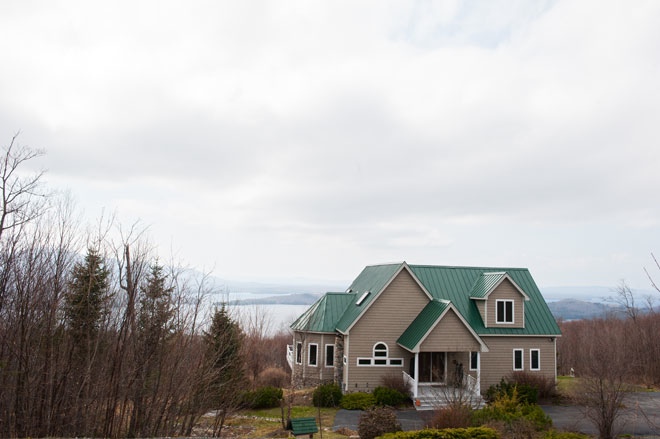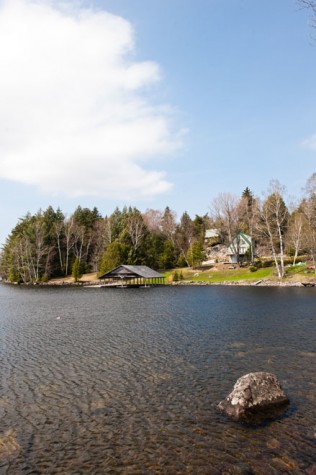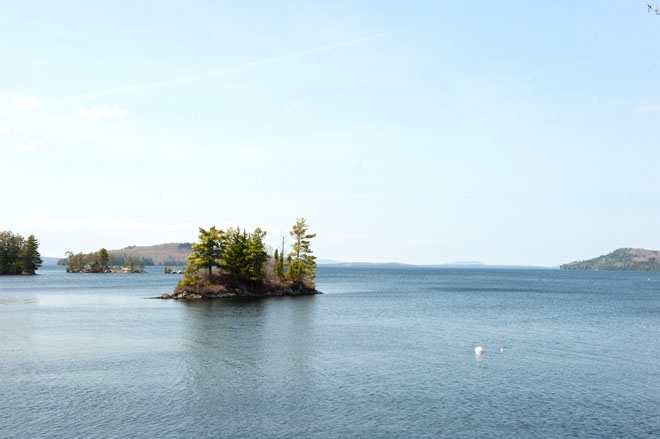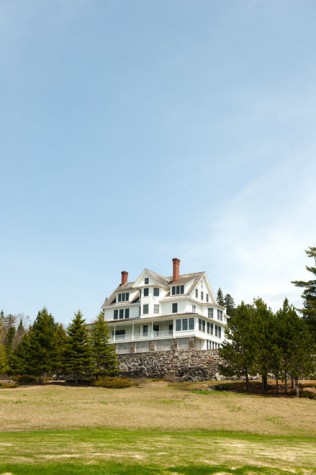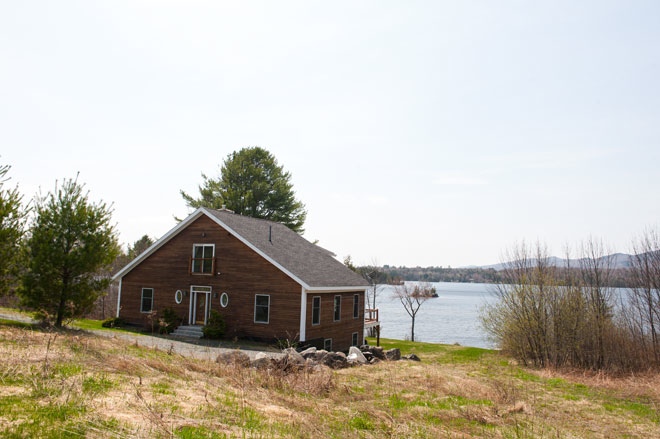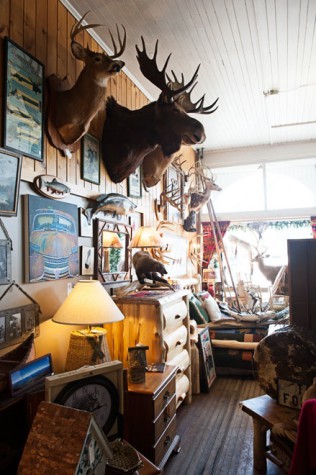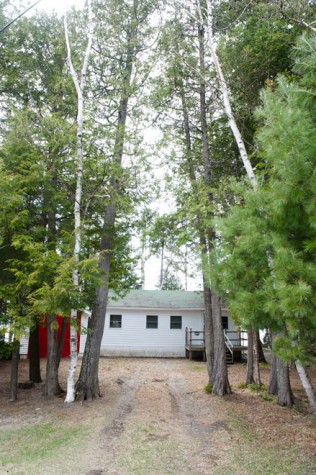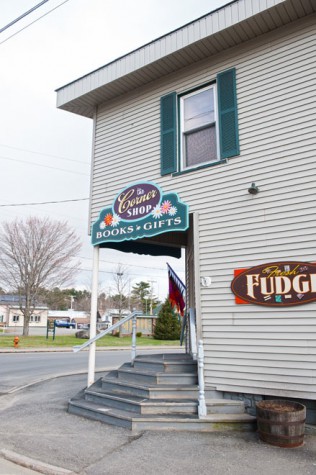The Rugged, Raw Beauty of Moosehead Lake
PORTRAIT OF PLACE
At the edge of the North Woods, Greenville on Moosehead Lake is a Maine home for people who love peace, quiet, and outdoor adventure
In Greenville, at the southern tip of Maine’s revered Moosehead Lake, there is the Junction Depot, a long, red structure with narrow strips of siding running this way and that and a charcoal-gray roof that peaks on one end like a party hat. Now the building is out of use and out of shape, but in the late nineteenth century and through the beginning of the twentieth, visitors came up from Philadelphia and New York and down from Montreal and Quebec City on the rusty tracks leading to this unique Victorian train station. I like to picture those rusticators disembarking here in all their finery, collecting suitcases, taking gulps of fresh air after the many hours-long rides from distant places and boarding steam boats along with lumbermen, mail, and supplies to grand resorts like the Kineo Hotel and Squaw Mountain Inn.
Times have changed, but Moosehead Lake, the place these people came to see and eventually to love, remains as beautiful as ever, a meandering 40 miles of water studded with islands and edged by the Longfellow Mountain range. Today, people are still coming—from America’s major cities in the Northeast and nearby Quebec City (just over a three-hour drive), but also from places like Germany, Switzerland, and Japan—to behold this unique beauty and to adventure around inside of it for a while.
In the middle of May, the town is readying itself for the summer. This far north, the snow has only recently melted and spring flowers have yet to pop, but there are hints of the busy season to come. After the long drive up from Portland on mostly empty highway, walking around the dusty downtown (mud season leaves its truck-tire shaped marks), I feel as though I’ve reached a frontier, landed in some kind of cowboy town with the moose for a mascot. The ice cream shop hasn’t opened yet, but most of the stores have, and people walking purposefully about the streets seem to have to-do lists in mind. Outside of the Indian Store at Kamp Kamp, wooden crafts and furniture clutter the sidewalks and woven blankets dance in the breeze. Kayaks and canoes fill racks in front of the Northwoods Outfitters, and men and women towing motorboats negotiate the four-ways with smiles and waves. The Katahdin—Moosehead Lake’s 100-year-old steamship—sits stoically in the glittering water beside the Marine Museum. It is noon, and the windows at the Auntie M’s Family Restaurant frame plenty of customers, mostly men, wearing Carhartt and flannel without a stitch of the irony they might carry elsewhere.
In classic Maine fashion, the reception I get at the diner is neither particularly warm nor cool, and certainly not phony; any layer of reserve fades quickly, and with questions come stories. Philip “Buster” Ladd talks of the logging industry, which boomed in the middle part of the twentieth century, then endured a steep decline when the local mill closed in 1972. Born and raised in Greenville, Ladd has worked driving trucks across the country for most of his life. “Everybody knows everybody,” he says of the home he could never leave for very long. “It’s quiet. Especially the winter. You have to bundle up, but when you do, it’s nice to be outside.” Registered Maine Guide Craig Stoddard, who moved up to Greenville from Cumberland County upon retiring from the Maine Turnpike Authority, agrees. “Sometimes on my way home from work from the marina, I don’t pass a single car,” he tells me. When I ask him where we should go that afternoon, a man from the back hollers out, “If you want to see trees, keep going.”
Greenville is situated near the southern border of the North Woods, which is made up of more than 3.5 million acres of forest land in northwestern Maine. Although Greenville sees several thousands of visitors throughout the year (Linda Bortis of the elegant Lodge at Moosehead Lake tells me business is up 17 percent for 2014), because of its scope, even at its busiest it never feels very busy. While Maine’s Route 1 jams up in July and August and millions climb up to the top of Cadillac on Mount Desert Island, there is more than enough road and water and mountain for anyone who visits this remote part of the state, at any time of year. The solitude this region affords, and the possibility for unmediated experiences with raw nature, never get old. Whitewater rafting in the Forks, hiking Mt. Kineo, Big Moose Mt., Little Moose Mt., or Katahdin in Baxter Park, mountain climbing, kayaking, canoeing, snowmobiling, ATVing, hunting, fishing, skiing—all of these activities are a short drive away from Greenville, where you can find guides, rentals, and the supplies you may need. Moose safaris are very popular, too, but if you stick around long enough, you might just encounter one of those magnificent beasts on a walk down Main Street.
From throughout Maine, New England, and elsewhere, a rugged set has built vacation homes along the water’s edge, often eschewing breezy cabins for solid log homes, crowded stretches of ocean for the calm of Moosehead. On dirt roads down to the water, or paved roads corkscrewing up to heights with a water view, are hefty houses with big-kid toys scattered out front—snowmobiles, ATVs, kayaks, trucks. Landscaping is typically minimal, or large-scale enough to make a statement amidst dense thickets. Along the main roads is a variety of homes like you’d see most anywhere in rural Maine, and there are small, resolutely unwinterized camps, too, plus mobile homes and mansions with stone chimneys soaring over the treeline. While few of the inns and lodges of the early twentieth century remain, new and renovated accommodations have sprung up to meet a wide range of wants and needs.
Inside the Blair Hill Inn, a panoramic view of the lake fills the windows, each pane containing a unique composition of water, woods, clouds, and light streaming down at dusk. Since moving to Greenville from a suburb of Chicago and buying this former private Victorian-style home in 1997, owners Ruth and Dan McLaughlin have put a great deal of time and energy into updating the sprawling property. In addition to less romantic but much needed repairs, they’ve outfitted the inn with a modern palette and classic decor that references the time period in which the house was built without overindulging in it. Inside the inn’s common areas, I can picture those train-traveling rusticators as well as their modern counterparts: people looking for adventure, but who want a shower and a fine meal at the day’s end just the same. At the Blair Hill Inn, the McLaughlins serve a nightly prix fixe meal of local food, much of which comes from the extensive gardens behind the inn.
“An inland, northern woods vacation is for people who are looking for an experience that is more about nature and the multitude of options a lake and mountains provide,” says Ruth. “On the coast, you’re somewhat limited to beaches and low-key walks. Here, you can go on serious hikes. You can whitewater raft or take the Katahdin to Lily Bay State Park for a picnic. There is simply a wider array of options.”
If you are lucky enough to have a small cabin with a porch that hovers over the water like a boat, then surely one of your best options is to sit on that porch with someone you love. The evening of my visit, this is how I find Ronald and Hazel Estey, who, in 1962, bought their summer home for $5,000. Retired, they spend almost four months of the year in Greenville, returning to South Portland when a chill sets in. After I stumbled on their yard accidentally, waved hello, and introduced myself, they called for me to come through the pine-coated pathway to their porch, to see their house and view. The lake, despite being the largest mountain lake in the Eastern U.S., was as still as a pond, warbling with the colors of the sunset reflected upon its surface.
I’ve heard Mainers call this place the “real Maine.” I don’t know about that; it seems to me that Maine is all of Maine—the woods and lakes and mountains and lobster rolls included. “Real,” though, seems right, despite how hard it is sometimes to believe that places as beautiful as Moosehead Lake exist, and despite how easy it can be to forget that, from anywhere in Maine, this place is at most just a few hours away.
